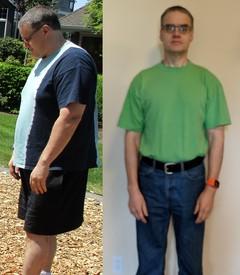How to account for skimming off fat in recipe calorie count?

maryjaquiss
Posts: 305 Member
Just out of interest really. I always account for the full amount of fat (weighed/measured) but I skimmed so much fat off a recipe I made the other night and I feel a bit sad that I may be depriving myself of calories unnecessarily! The recipe for 6 had 2 tbsp olive oil, 50g butter and then quite a fatty cut of lamb. I'm fully aware I didn't get rid of all of the fat, but what I skimmed off filled a whole ramekin plus a couple more tablespoons, which must have had a significant calorie count!
0
Replies
-
I'm sorry I can't help you with what you're asking. I'm trying to figure out why you would pick a fatty recipe and then remove the fat, which is both good for you and delicious, what a waste - taste, money, effort - and did you pour the fat into the sink?1
-
kommodevaran wrote: »I'm sorry I can't help you with what you're asking. I'm trying to figure out why you would pick a fatty recipe and then remove the fat, which is both good for you and delicious, what a waste - taste, money, effort - and did you pour the fat into the sink?
I wouldn't normally, I'm totally not a freak about that sort of thing! I love fat! It would have been very, very greasy with all of it in though. It was per the recipe instructions (this one if you're interested) - not from any sort of mad diet recipe book.0 -
(I also didn't trim the excess fat from the lamb at the beginning)
I am very keen not to come across as a fat hater here 0
0 -
You could always weigh what you removed and subtract that from the total. Olive oil is 120 cal / tbsp and most fats are in the same neighborhood.1
-
The only time I do this is when I don't realise that a recipe involves chucking most of some fat away. For example a lamb recipe I made the other day called for 100 ml of olive oil, but most of that is discarded as it was drizzled over lamb chops before putting them (and no surplus oil) in a pan. Another recipe called for 600 ml of whole milk but that was for soaking some kidney and was discarded and the kidney rinsed, so I only accounted a small amount.
Unless you are skimming off rendered fat that you could reasonably measure once cooled and solidified, I'm not sure how you could measure it, as it's likely you are also skimming off some liquid. Maybe just leave the fat in and fiddle with the portion size until it's the right size for your calorie intake.1 -
When I cook, I weigh/measure each ingredient and put those totals in the recipe builder. When I finish cooking, I weigh the entire finished product and set the servings to that weight. For example, I made black bean soup the other day and the finished soup weighed 2800 grams so I set the recipe servings to 2800. Then when I'm ready to eat, I weigh the portion I'm going to eat (in the soup case, 350 grams) and log it as 350 servings. If I skimmed any congealed fat off the top of the soup (cause YUCK!) then it would be reflected in the portion weight. I also weigh any leftovers on my plate (including bones or excess fat) and subtract that from my initial portion total cause yep, I'm always angling to maximize my calories!2
-
My first thought is to refrigerate what you remove. Even olive oil goes solid. Water can then be drained. That would let you come close to estimating the amount of fat removed. Me if I weigh it I am eating it. If I wasn't eating it then I need to estimate what I removed. Only way to make sure I hit my macros and don't have too few or too many calories.1
-
If the main concern is depriving yourself of calories, I would say don't sweat it. If your eating habits are relatively consistent over time then just go with it. If you end up finding that you're losing weight faster than you need to then just up your calorie budget a bit and be consistent about how you eat and log.
Keep in mind, MFP doesn't know what your exact metabolism is. It guesses. So nothing is going to be perfect. But as long as you are logging regularly and consistently you'll be in good shape as long as you realize that you can/should adjust your budget.1 -
managematics wrote: »If the main concern is depriving yourself of calories, I would say don't sweat it. If your eating habits are relatively consistent over time then just go with it. If you end up finding that you're losing weight faster than you need to then just up your calorie budget a bit and be consistent about how you eat and log.
Keep in mind, MFP doesn't know what your exact metabolism is. It guesses. So nothing is going to be perfect. But as long as you are logging regularly and consistently you'll be in good shape as long as you realize that you can/should adjust your budget.
I'm sure you're right. I'm maintaining now but I'm also training for a half marathon and am very conscious of needing to fuel myself properly to avoid burning out, even if it means putting on a few pounds in the run-up to the event (I have a bit of leeway in my healthy weight range). Struggling a bit with today because I'm 450 calories under maintenance after a long interval run this morning, even with all the fat from my recipe planned in! Sounds like it's going to be cake for dessert tonight...0
This discussion has been closed.
Categories
- All Categories
- 1.4M Health, Wellness and Goals
- 398.5K Introduce Yourself
- 44.7K Getting Started
- 261K Health and Weight Loss
- 176.4K Food and Nutrition
- 47.7K Recipes
- 233K Fitness and Exercise
- 462 Sleep, Mindfulness and Overall Wellness
- 6.5K Goal: Maintaining Weight
- 8.7K Goal: Gaining Weight and Body Building
- 153.5K Motivation and Support
- 8.4K Challenges
- 1.4K Debate Club
- 96.5K Chit-Chat
- 2.6K Fun and Games
- 4.8K MyFitnessPal Information
- 18 News and Announcements
- 21 MyFitnessPal Academy
- 1.5K Feature Suggestions and Ideas
- 3.2K MyFitnessPal Tech Support Questions




